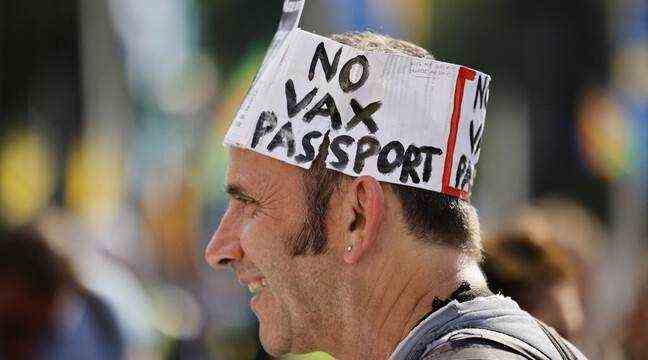Reverse for Boris Johnson’s teams. After announcing last week the establishment, at the end of September, of a vaccine passport to access stadiums and nightclubs, the British government finally gave up its project on Sunday.
“We have seen it as it should be, and while we should keep it in reserve as a potential option, I am delighted to say that we will not proceed with our vaccine passport project,” said Minister of Health, Sajid Javid, believing that the introduction of a vaccination passport would be superfluous because of the success of the vaccination campaign against the coronavirus. More and more British people are being vaccinated, but the epidemic, revived by the Delta variant, is far from over. But then why did the British government take such a decision?
No more vaccinations but no more hospitalizations
If the government has decided to abandon the introduction of a vaccination passport in England, it is first of all thanks to the success of the vaccination campaign. To date, over 80% of the UK population over 16 is fully vaccinated, according to the latest data available. In detail, as of September 11, 2021, more than 48 million Britons had received a first dose and 43 million a second injection. As for contaminations, which experienced a marked increase at the beginning of the summer due to the circulation of the Delta variant, they seem to be gradually decreasing for several days. While the UK neared 60,000 daily cases in mid-July,
health services recorded, in recent days, nearly 40,000 contaminations every day.
Yet the UK is far from having finished with the coronavirus epidemic. Fewer cases of contamination and more vaccinations, of course, but the number of hospitalizations is rising sharply. On September 8, more than 8,000 coronavirus patients were hospitalized in the UK, a figure that had not been reached since March 10, according to data from the Ministry of Health. By comparison, less than 1,000 patients were hospitalized in the UK between mid-May and mid-June.
Critics in his own camp
Yet according to a YouGov poll, published in early August, nearly 60% of Britons say they are in favor of the introduction of a vaccination passport, against 32% opposed. Would the decision be political? Last week, by announcing the introduction of this vaccine passport, the Prime Minister, Boris Johnson, had drawn the wrath of the night sector, of opposition MPs, but also of Conservative MPs, within his own camp. “It is clearly a political reversal. Boris Johnson was under pressure from the opposition, but especially from his own camp. It was internal criticism that prompted him to come back to this system, ”explains Clémence Fourton, lecturer in English-speaking studies at Sciences Po Lille and author of The United Kingdom, a country in crisis? (Ed. Blue Rider 2021), at 20 minutes.
An idea shared by Olivier de France, director of the Europe program at the Institute for International and Strategic Relations (Iris) and specialist in Great Britain: “This is not a concession granted to the opposition. Boris Johnson has a very large majority, his main concern is his own party. There were divergent opinions on the vaccine passport even within the conservative party ”, estimates near 20 minutes the specialist, arguing that this is not the first time since the start of the health crisis that some conservatives are opposed to Boris Johnson.
A libertarian tradition
Historically land of individual freedom, would the United Kingdom have trouble with the vaccination passport? No doubt, for Olivier de France, who recalls that the tradition of defending civil liberties goes back to the Magna Carta of 1215 and the Bill of Rights, “Bil of Rights” of 1689. “No British citizen is legally required to carry an identity document. It’s a certain conception of the freedom to go about your daily business, ”he says. “But between this long British history of freedom and the reality of the pandemic, where do we put the cursor? Asks the director of the Iris Europe program.
For Clémence Fourton, we must distinguish three elements: medical data, “like the British equivalent of TousAntiCovid, acclaimed by the population, which posed no problem”, identity documents, “whose systematic use has has always been abandoned in the United Kingdom ”, and the commercial use of data,“ criticized in particular by Labor ”. “The government is trying to find a balance between the British libertarian tradition, that is to say against state intervention in people’s freedoms, and the repressive function of the state in certain areas,” he analyzes. -she.
Without forgetting that this vaccine passport would only have concerned England. As each constituent nation of the kingdom is competent for anti-Covid restrictions, Scotland has decided to introduce, as of October 1, a vaccination certificate to access nightclubs and certain events. “Scotland is aligning itself with European policy, it is both a signal of Europhilia and at the same time a strong signal of opposition against England”, continues Clémence Fourton. Boris Johnson is expected to speak within a few days to deliver the details of his battle plan for the fight against the coronavirus for the winter period.

